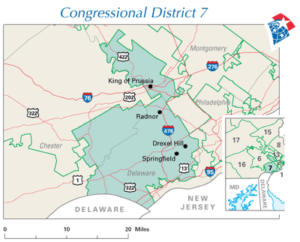 Steve Welch’s business card could be three times the size of a normal person’s.
Steve Welch’s business card could be three times the size of a normal person’s.
The Penn State grad founded the Mitos Group, a biotech company that grew to over 40 employees before it was sold to a Fortune 500 company when Welch was 29. Welch then co-founded DreamIt ventures, an early-stage incubator based in the University City Science Center. And, most recently he just fathered his second child.
But 32-year-old Welch, the new-father-entrepreneur-angel investor, is looking to add another job title to his resume: congressman.
Earlier this month, he launched his candidacy for the 7th congressional district of Pennsylvania with a video on his Web site.
Welch will become the Republican challenger to Democratic representative Joe Sestak. Sestak ultimately may not be his opponent, as he is said to be considering a showdown for the Democratic Senate seat against newly-minted Democrat Arlen Specter.
If elected, he would be the second youngest congressman, behind 28-year-old Aaron Schock (R- Minn.).
True to his past, Welch sees small business as the way out of the recession for the country and for Philadelphia. Welch says the level of spending and government impact on the free market is one of the primary reasons he is running. When we spoke, his second child was still on the way, and the thought that he would be born into debt was a motivation to act.
For the past year, Welch was an Eisenhower Fellow, which allowed him to travel the world taking notes on the best tactics for encouraging small business development.
“In my heart of hearts, I love seeing a need in the marketplace and rushing to fill that need. It’s the greatest rush in the world,” says Welch.
One plan he is fond of, he said, was the tactic of the government matching local early stage investments. That way, firms can decide what is the best investment, and the government can increase the flow of early stage capital with little to no additional labor or bureaucracy.
“We want the best in the world to land in Philadelphia,” he says, “that’s the greatest way to ensure long term success in this region.”
We chatted with Welch about small business in Philadelphia, and the effect of organizations like DreamIt and Ben Franklin Technology Partners.
One of the hot issues at the moment, is the future of Ben Franklin Technology Partners, what is your take on their future?
Ben Franklin companies have had a huge impact on this region. Somebody that’s never been in the business doesn’t understand that once that money goes into a Ben Franklin-funded company… Give me a Ben Franklin funded company.
How about Vuzit?
Vuzit! So Vuzit has vendors that are local and that they are spending money with. They have attorneys that they are spending money with. It creates a curculation of funds in the early stage of businesses, which is undeniable. You look at any stat out there and you will see that small businesses create jobs, not big businesses.
That was something that was often tossed around during the presidential election.
Yep. And if you look, the patents filed by small businesses are more relevant, they get cited more often and [generate] more sales revenue. So small business are more innovative and therefore have a greater impact on society … If jobs are the government’s number one priority, [Ben Franklin Technology Partners] is the last thing I would cut.
What role does DreamIt play in fostering small businesses?
We’re very early-stage, we often invest in ideas on a napkin. So they have a long way to grow.
Last year we had several companies that got additional funding and that added jobs in the area and those companies will have a big impact. We are bringing companies here now, and once they are here they are more likely to stay here so they will add jobs to the region.

Can you detail how DreamIt works?
We open up the application for a couple of months, this year we received several hundred. We care about what’s the need in the market place, what makes your product different and what makes you think you can do it. If it takes you more than an hour to finish our application, you’re doing it wrong.
We have some companies that are already generating revenue .. and some companies come in and do a 180-degree turn, and that’s great.
How so?
If you find that out fast, good, and you can change directions. And that is one of the things we need as a society. We need risk-taking to occur. We need to see what works and doesn’t work. That’s how you create innovation, that’s how you create new markets and that’s how you create jobs.







